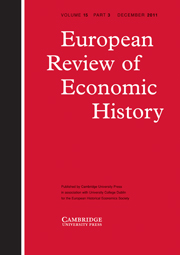Crossref Citations
This article has been cited by the following publications. This list is generated based on data provided by
Crossref.
Dincecco, Mark
2008.
Fiscal Centralization, Limited Government, and Public Revenues in Europe, 1650-1913.
SSRN Electronic Journal,
Dincecco, Mark
2008.
Political Regimes and Sovereign Credit Risk in Europe, 1750-1913.
SSRN Electronic Journal,
Daudeij, J. M. F.
2009.
The International Encyclopedia of Revolution and Protest.
p.
1.
Dincecco, Mark
2009.
Fiscal Centralization, Limited Government, and Public Revenues in Europe, 1650–1913.
The Journal of Economic History,
Vol. 69,
Issue. 1,
p.
48.
VERMEESCH, GRIET
2009.
War and garrison towns in the Dutch Republic: the cases of Gorinchem and Doesburg (c. 1570–c. 1660).
Urban History,
Vol. 36,
Issue. 1,
p.
3.
Dincecco, M.
2009.
Political regimes and sovereign credit risk in Europe, 1750-1913.
European Review of Economic History,
Vol. 13,
Issue. 1,
p.
31.
Ma, Debin
2010.
Community, Market and State in Development.
p.
64.
van Nederveen Meerkerk, Elise
2010.
Professionalization of Public Service: Civil Servants in Dordrecht, 1575-1795.
Journal of Urban History,
Vol. 36,
Issue. 3,
p.
345.
Karaman, K. Kivanç
and
Pamuk, Şevket
2010.
Ottoman State Finances in European Perspective, 1500–1914.
The Journal of Economic History,
Vol. 70,
Issue. 3,
p.
593.
Koyama, Mark
2010.
The political economy of expulsion: the regulation of Jewish moneylending in medieval England.
Constitutional Political Economy,
Vol. 21,
Issue. 4,
p.
374.
DINCECCO, MARK
2010.
Fragmented authority from Ancien Régime to modernity: a quantitative analysis.
Journal of Institutional Economics,
Vol. 6,
Issue. 3,
p.
305.
Gelderblom, Oscar
and
Jonker, Joost
2011.
Public Finance and Economic Growth: The Case of Holland in the Seventeenth Century.
The Journal of Economic History,
Vol. 71,
Issue. 1,
p.
1.
Karaman, K. Kıvanç
and
Pamuk, Sevket
2011.
Different Paths to the Modern State in Europe: The Interaction between Domestic Political Economy and Interstate Competition.
SSRN Electronic Journal,
VAN LEEUWEN, MARCO H. D.
2012.
Guilds and middle‐class welfare, 1550–1800: provisions for burial, sickness, old age, and widowhood1.
The Economic History Review,
Vol. 65,
Issue. 1,
p.
61.
van Zanden, J. L.
Zuijderduijn, J.
and
De Moor, T.
2012.
Small is beautiful: the efficiency of credit markets in the late medieval Holland.
European Review of Economic History,
Vol. 16,
Issue. 1,
p.
3.
VAN ZANDEN, JAN LUITEN
BURINGH, ELTJO
and
BOSKER, MAARTEN
2012.
The rise and decline of European parliaments, 1188–17891.
The Economic History Review,
Vol. 65,
Issue. 3,
p.
835.
TEEUWEN, DANIËLLE
2012.
Collections for the poor: monetary charitable donations in Dutch towns, c. 1600–1800.
Continuity and Change,
Vol. 27,
Issue. 2,
p.
271.
Hartman, Jan
and
Weststeijn, Arthur
2013.
The Political Economy of Empire in the Early Modern World.
p.
11.
KARAMAN, K. KIVANÇ
and
PAMUK, ŞEVKET
2013.
Different Paths to the Modern State in Europe: The Interaction Between Warfare, Economic Structure, and Political Regime.
American Political Science Review,
Vol. 107,
Issue. 3,
p.
603.
Ma, Debin
2013.
State capacity and great divergence, the case of Qing China (1644–1911).
Eurasian Geography and Economics,
Vol. 54,
Issue. 5-6,
p.
484.




